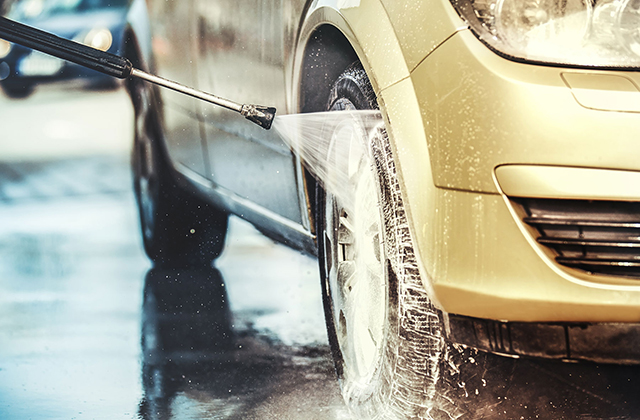It’s never too early (or late) to start teaching your kids how to make sustainable decisions, especially when it comes to the little things. Even changing out your lightbulbs to more sustainably-sourced LED lights can have a huge impact. Most of the cleaning products you find at the store can be easily replaced with safer, gentler, easy-to-make alternatives. Plus, more often than not, these green alternatives end up being much cheaper than their harsher counterparts. Car detailing products is a perfect fit to make your day easy when polishing your car.
Will we provide an overnight solution to global warming? No. But we might if every individual focused on following natural (or organic) processes through every aspect of their lives. Let’s focus on one of the big (yet often-overlooked) routine that is desperate for a green makeover: a car wash.
Whether you plan on driving through the local carwash or taking the kids out with buckets and sponges on a Saturday afternoon to clean up the family van, cleaning a car might seem like a pretty simple, eco friendly lesson. It certainly can be – but only if you know what to avoid, what to use, and how to do it right.
What NOT to Use in Your DIY Car Wash
As a rule of thumb for deciding on whether or not a certain product uses “green” ingredients: read the labels! Generally, if your car wash soap or cleaner has one of these chemicals in it, they are NOT safe:
Quarternary Ammonium Compounds, also known as “QUATS.” They’re found in most household cleaners and are labeled as “antibacterial. They are a major skin irritant, especially for younger children. A great, safe, and green alternative to QUATS is something we all carry in our pantries: vinegar.
Phosphate, surfactants, triclosan are often labeled as “antibacterial” ingredients but are often extremely harmful to aquatic life, which may be affected if you allow the run-off from your car into the storm drain.
Ammonia. We’ve all heard about it and it’s a truly detrimental chemical. Found most often in glass cleaners, ammonia is a lung irritant that can induce asthma and other long-lasting effects. You might want to consider using vodka or toothpaste to clean up your windows, especially if you enlist the kiddos to help.
Perchloroethylene or “PERC”. Found carpet and upholstery cleaners, this one is especially dangerous. As a neurotoxin, PERC can affect the brain and cause painful headaches if inhaled. Three cups water, ¾ cup of a vegetable-based liquid soap, and 10 drops peppermint essential oil will make your carpets look like new, without any harmful side effects.
Even if you check the label and none of the above ingredients are mentioned, still take extra precaution. If there’s a chemical in the list you don’t recognize, look it up. Basically, the only ingredient for a good, clean scrub is lye — made up of caustic soda, sodium hydroxide, NaOH, potassium hydroxide, KOH, or NaOH/KOH. Other things to avoid in soaps and cleaners are excessive fragrances, lard, tallow, and parfum. We’ll provide you with a further list of green alternatives later on.
Car Wash Water Conservation: How to Do It Right the First Time
Washing your car is actually the biggest source of water waste in a family household. While most installed toilets will flush only about 3.5-7 gallons, a fifteen-minute car wash can waste 40-140 gallons! That means you’d have to take an hour and a half long shower to waste the same amount. Yikes! In addition to proven links to poor fish population and health, some experts also believe that this over-watering runoff is the cause of 50% of landscape water waste.
Here are some easy ways to save water while washing your car:
Avoid storm drains and park your car on grass or an area where the water can filter into the ground.
Keep the drainage away from the storm drain. Many local governments lend out pump kits at no cost. These pumps temporarily plug the storm drain and pump the dirty water to the sanitary sewer, thereby preventing the runoff ending up in a river.
Dispose all your soapy water out in the sink or into the ground.
There are also eco friendly commercial car washes like GeoWash or DetailXPerts where the wash water drains to the sanitary sewer. Some car washes recycle water instead of letting it run down the sewer drains. Saving the planet and some time? Sounds like a great idea!
Eco Friendly Car Wash Soap: Small Changes You Can Make
Now that we’ve got the big dangerous stuff already covered, let’s get into the nitty-gritty: how to have an eco friendly car wash. If you use it to clean your car, we probably found a green, healthy, organic alternative.
What you use: antibacterial soap; what you should use: DIY biodegradable car wash
With some liquid dishwashing detergent, sustainable laundry detergent, and three gallons of water, you got yourself green, clean, dirt-fighting machine! Remember to always check that any ingredients you use for your mixture are chlorine-and-phosphate free, as well as non-petroleum based.
What you use: your average garden hose; what you should use: a hose with a shut-off valve
This minor modification will reduce possible runoff from your lawn. Another great alternative to using/wasting tons of water with a hose (leaky or not) is to simply use a bucket and sponge. A hose can waste 6 gallons every minute, but using a bucket and sponge only uses a few gallons!
What you use: a big yellow sponge; what you should use: a real sea sponge.
The process to mold sea sponges into something we humans can use is very eco friendly; there are no harmful byproducts that result and there is little waste, as any excess is ground up and recycled back into the mix.
You can also go one water-saving step further: instead of throwing dirty sponges in the washing machine, microwave them. Disinfect your natural sponge by soaking them in vinegar or boiling them with water.
If you’re still concerned about any environmental effects of collecting natural sponges for commercial use, rest knowing there are other alternatives. You can use rags made from sustainable fibers like hemp and bamboo, or sponges made from corn fibers, coconut husks, coconut coir fiber, plant-based cellulose, or a combination of agave and nylon fibers.
What you use: tire cleaners; what you should use: water-based tire dressings.
Be careful though when applying these dressings. While they seem like the perfect, eco friendly option, they can dry and/or crack the surface of your tires if applied incorrectly.
What you use: Armor All; what you should use: distilled water + baby oil + vinegar + Dawn soap or Melaleuca oil
We found a great DIY Armor All wipes recipe here that is very environmentally friendly and ended up costing only $0.02 to make.
What you use: harsh, light-cleaner chemicals; what you should use: soap, baking soda, and vinegar
Having a murky headlight can diffuse the light from the perspective of the driver, which reduces forward visibility. Conversely, these headlights could project higher light levels toward oncoming vehicles, which then blind an oncoming driver. You can also use toothpaste, water, and a toothbrush to bustle away that grime.
What you use: Windex to clean your windshield; what you should use: lemon juice, white vinegar, and water (or Coca Cola!)
Yes, you read that right. Coca Cola can make your windows shine like new! You can also reduce your waste, eliminate toxins from your home, and save mucho moola each year by making your own window cleaner solution. That being said, always keep an eye out for DIY recipes that are actually really harmful for the environment — if they use ammonia or dish soap, don’t use them!

